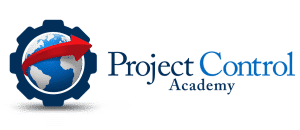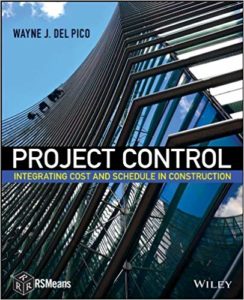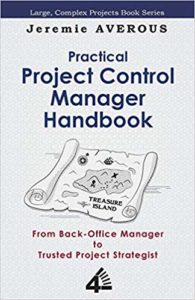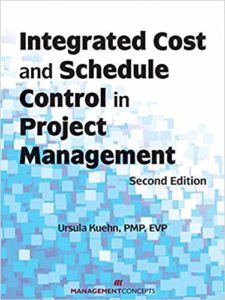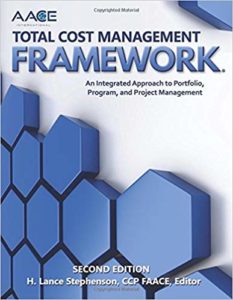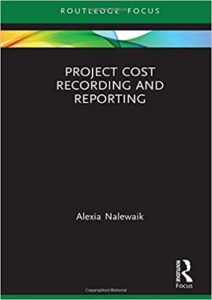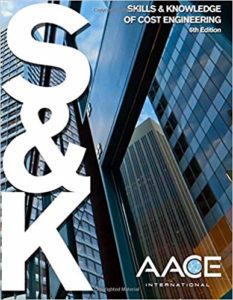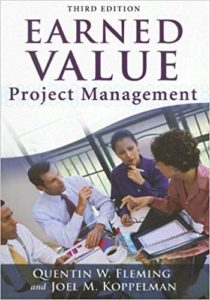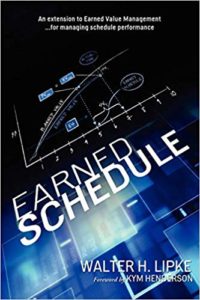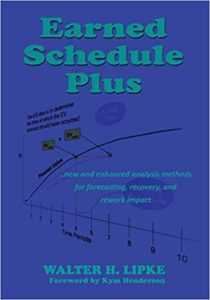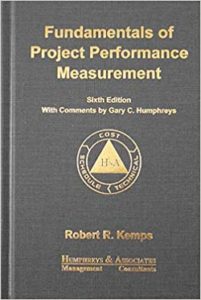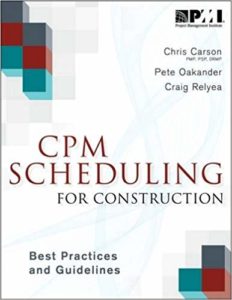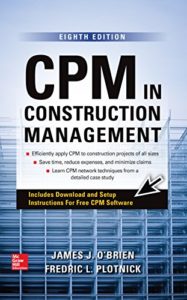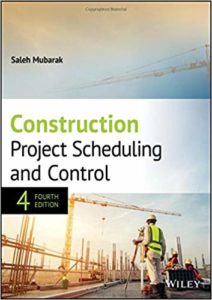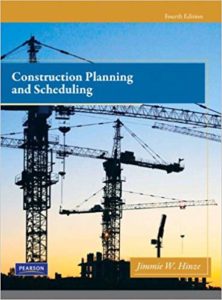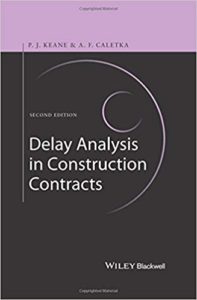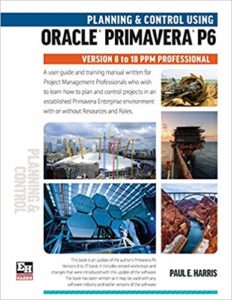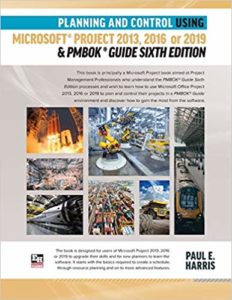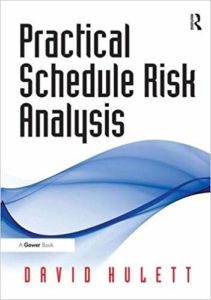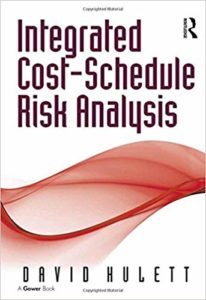Project Controls Books
Demystifying Project Controls by Dimitris Antoniadis
Whether you are working in project control or indeed any other discipline, on a small or mega project, in any industry or type of organisation, in this book you will read almost everything you need to know about project control. You will be told about truths and issues that are not readily discussed and be given a large number of examples that are not always easily accessible.
Project Control: Integrating Cost and Schedule in Construction by Wayne J. Del Pico
The key to successful project control is the fusing of cost to schedule whereby the management of one helps to manage the other. Project Control: Integrating Cost and Schedule in Construction explores the reasons behind and the methodologies for proper planning, monitoring, and controlling both project costs and schedule. Filling a current void the topic of project control applied to the construction industry, it is essential reading for students and professionals alike.
Practical Project Control Manager Handbook by Jeremie Averous
From Back-Office Manager to Trusted Project Strategist Project Control Managers when they exist in Projects are still too often focused on data-crunching and reporting. They do not deliver the potential immense value they could provide in terms of analysis, forecasting and strategic support. The ambition of this must-have handbook is to change this situation. It originated in the trenches of actual Project execution: it is not a heavy and detailed bible, but rather a practical reference for Project practitioners to understand the principles and traps of of Project Control Management over the entire lifecycle of Large or Complex Projects.
Integrated Cost and Schedule Control in Project Management, by Ursula Kuehn
The Practical, Precise, and Proven Approach to Integrated Cost and Schedule Control! This trusted project management resource, now in its second edition, includes expanded coverage of how integrated cost and schedule control works within the federal government. With the renewed emphasis on transparency in government, the processes detailed in this book are particularly relevant. The step-by-step presentation, numerous case studies, and instructive examples give practitioners relevant material they can put to use immediately.
The Practitioner Handbook of Project Controls, by Shane Forth
Although projects always carry risk, too many projects run late or exceed their original budgets by eye-watering amounts. This book is a comprehensive guide to the procedures needed to ensure that projects will be delivered on time, to specification and within budget.
Eight expert contributors have combined their considerable talents to explain all aspects of project control from project conception to completion in an informative text, liberally supported where necessary by clear illustrations.
This handbook will benefit all project practitioners, including project managers and those working in project management offices. It will also provide an invaluable guide for students studying for higher degrees in project management and its associated disciplines.
Cost Management Books
AACE International Total Cost Management Framework: An Integrated Approach to Portfolio, Program, and Project Management by John Hollman & Lance Stephenson
Total cost management (TCM) is the effective application of professional and technical expertise to plan and control resources, costs, profitability and risk. Simply stated, TCM is a systematic approach to managing cost throughout the life cycle of any enterprise, program, facility, project, product or service. The TCM Framework is a representation of that systematic approach. This second edition of the book offers enhanced process maps through the use of color to emphasize the plan-do-check-act (PDCA) steps integral to TCM.
Project Cost Recording and Reporting by Alexia Nalewaik
Communication is a vital part of project management, and reports are one of the preferred vehicles for transmitting information to an intended internal or external audience. Reports are also part of the system of control and governance on projects, used to bring attention to issues and prompt action to improve project outcomes.
There are countless ways of combining project information for consumption by stakeholders. This book discusses the purpose of project reports, and provides examples of the format, content, timing, and audience for various types. Using principles of stakeholders and risk management, it presents a rationale for communication plans, enabling appropriate reporting at the project, program, and portfolio level.
Skills & Knowledge of Cost Engineering 6th Edition 6th Edition by Dr. Markarand Hastak PE CCP
This Education Board publication provides comprehensive and in-depth information on a wide range of cost engineering subjects and will prove to be a valuable resource to any individual seeking professional growth or pursuing an AACE International certification. This publication offers six sections comprising 34 chapters of content on topics such as cost estimating, project planning, value engineering, and strategic asset management, to name a few.
Earned Value Management Books
Earned Value Project Management by Quentin W. Fleming and Joel M. Koppelman
This book presents an introduction to earned value management techniques, discussing how they are used to monitor a project’s performance against an earned value baseline, notify stakeholders of costs and timelines, and predict final project effectiveness.
Earned Schedule by Walter H. Lipke
This book is intended for those who use Earned Value Management (EVM), including project managers, engineers and performance analysts. Earned Schedule (ES) is a significant enhancement to EVM, extending its cost-based features to the management and control of schedule performance. By using ES and EVM together, project management of cost and schedule can now be treated in a truly integrated sense.
Earned Schedule Plus by Walter H. Lipke
Fundamentals of Project Performance Measurement by Robert R. Kemps
This book discusses the fundamentals of performance measurement using Earned Value. The approach integrates technical schedule and cost goals into highly visible management tools. There are numerous illustrated examples to clarify purposes that can be read and understood at a single sitting.
Planning Scheduling Books
CPM Scheduling for Construction: Best Practices and Guidelines by Chris Carson, Peter Oakander, and Craig Relyea
This volume compiles the work coordinated by the Scheduling Excellence Initiative Committee (SEI) to improve standardization and provide best practice guidelines for scheduling processes in the construction industry. It serves as a guide for all schedulers and planners from entry level to senior schedulers, as well as non-schedulers in management roles.
CPM in Construction Management by James O’Brien and Fredric Plotnick
Plan, schedule, and manage construction projects using the critical path method (CPM) and the practical information contained in this thoroughly revised book. Written by two experienced engineers and authors, CPM in Construction Management, Eighth Edition, explains the evolution of CPM and fully covers the latest techniques, standards, and tools. The “John Doe” case study is used throughout to illustrate important functions, including acquiring and building the logic plan, navigation and best use of multiple software products, updating, cost control, resource planning, and delay evaluation.
Construction Project Scheduling and Control, by Saleh A. Mubarak
Construction Project Scheduling and Control provides a comprehensive examination of the analytical methods used to devise a reasonable, efficient, and successful schedule for construction projects of all sizes. This updated third edition contains new information on building image modeling (BIM) and its relationship to project scheduling and control, as well as thorough coverage of the latest developments in the field.
Construction Planning and Scheduling, by Jimmie W. Hinze
This book offers broad coverage of all major scheduling subjects. This comprehensive resource is designed for construction management, planning and scheduling. It follows a logical progression, introducing precedence diagramming early and following with chapters on activity durations, resource allocations, network schedules, and more. It reflects current trends in scheduling (short-interval scheduling, computer scheduling, linear scheduling etc.) and includes chapters on arrow diagramming and PERT.
Delay Analysis in Construction Contracts by P. John Keane and Anthony F. Caletk
This book is a practical guide to the process of delay analysis and includes an in-depth review of the primary methods of delay analysis, together with the assumptions that underlie the precise calculations required in any quantitative delay analysis. The techniques discussed can be used on projects of any size, under all forms of construction contract, both domestic and international.
Planning and Control Using Oracle Primavera P6 Versions 8 to 18 PPM Professional, by Paul E Harris
A user guide and training manual written for Project Management Professionals who wish to learn how to plan and control projects in an established Primavera Enterprise environment with or without Resources and Roles. The book has been written so it may be used with any software industry version. It is packed with screen shots, constructive tips and contains workshops with solutions at the end of each chapter for the reader to practice the skills taught.
Planning and Control Using Microsoft Project 2013, 2016 or 2019 & PMBOK Guide Sixth Edition by Paul E Harris
This book is principally a Microsoft Project book aimed at Project Management Professionals who understand the PMBOK Guide Sixth Edition processes and wish to learn how to use Microsoft Office Project 2013, 2016 or 2019 to plan and control their projects in a PMBOK Guide environment and discover how to gain the most from the software. The book is packed with screen shots, constructive tips and is suitable as a training course handout, for learning the software or as a reference book.
Project Risk Analysis Books
Project Risk Quantification by John Hollman
Project Risk Quantification presents the most practical, realistic, and integrated approach to project cost and schedule Risk Quantification that is available today! It offers proven, empirically-valid methods and tools applicable to projects of all types and at all decision gates. The text is written for both the manager and the risk analysis practitioner. It will bring reliable accuracy and contingency determination to your capital project organization.
Practical Schedule Risk Analysis by David Hulett
A schedule risk analysis explores the implications for the project’s schedule of risk to the activity durations and also identifies the most important schedule risks. This analysis, building on and extending CPM scheduling, will result in a more accurate estimate of completion and provide an early opportunity for planning effective risk mitigation actions. Practical Schedule Risk Analysis contains a complete treatment of schedule risk analysis from basic to advanced concepts.
Integrated Cost-Schedule Risk Analysis by David Hulett
Risks to cost come from multiple sources including uncertain project duration, which is often ignored in cost risk analyses. There are effective ways to estimate the impact on the cost of complex projects from project risks of all types. This book helps us determine how likely the project will go over budget with the current plan, how much contingency reserve is required to achieve a desired level of certainty, and which risks are most important so the project manager can mitigate them and achieve a better result.
Leadership and Success Books
Leadership Soup by Kamran Akbarzadeh
Leadership Soup is an award-winning book that provides you a healthy yet tasty recipe for living on purpose and leading on purpose. It helps you become a profound and authentic leader who leads with the heart and empowers others to soar to greatness no matter who they are and what they do.
Leadership Soup reminds you that people need to be valued; their voices need to be heard; and their potential needs to be developed. This way they will be inspired to imbibe the culture of authentic leadership, become united, and make impossible possible.
Whether you are a business owner, employee, entrepreneur, coach, corporate executive, consultant, student, parent, experienced leader, or apprentice, Leadership Soup can act as a catalyst for the positive changes you need to make in yourself and others.
Get What You Want by Kamran Akbarzadeh
If you want to go up the ladder of success, if you want to get what you want, if you want to fulfill that “burning desire” that keeps your mind busy all the time and you do not do something about it, if you want to do “that thing” that you wanted to do some day but you never got a chance to do so, you must take your hands out of your pockets, roll up your sleeves, and take action now.
You cannot sit still and expect the elevator of success to come down and take you to the peak. It has not happened to anyone. It will not happen to you either, guaranteed!
Over the past several years I have helped many people like you to take their hands out of their pockets and climb their ladder of success. I have spent quality time with them, listened to them, felt their pain, assisted them in taking the right path, and made sure they came out of the process successful and fulfilled.
I want to help you too. If you are committed to YOUR success and want to get what you truly want, this book is an excellent start.
